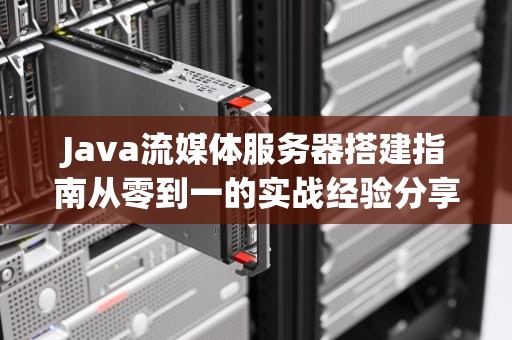大家好,我是你们的Java老司机,今天我们来聊聊一个既高大上又接地气的话题——Java流媒体服务器。如果你对“流媒体”这个词感到陌生,别担心,我会用最通俗易懂的方式带你走进这个神奇的世界。想象一下,你正在看一部高清电影,画面流畅得就像在自家客厅里播放一样,这背后就是流媒体服务器的功劳。那么,如何用Java搭建一个这样的服务器呢?且听我慢慢道来。

我们得搞清楚什么是流媒体服务器。简单来说,流媒体服务器就是一种能够实时传输音频、视频等多媒体内容的服务器。它不像传统的下载方式那样需要等待整个文件下载完毕才能播放,而是可以边下载边播放,大大提升了用户体验。
举个例子,你在B站看视频时,视频是分段加载的,这就是流媒体的典型应用。而Java作为一种强大的编程语言,自然也能胜任搭建流媒体服务器的任务。
你可能会问:“为什么偏偏是Java?”其实原因很简单:
1. 跨平台性:Java的“一次编写,到处运行”特性使得它在不同操作系统上都能稳定运行。
2. 丰富的库和框架:Java拥有大量的开源库和框架,如Netty、Spring Boot等,这些工具可以大大简化开发流程。
3. 社区支持:Java拥有庞大的开发者社区,遇到问题时可以轻松找到解决方案。
接下来,我将手把手教你如何用Java搭建一个简单的流媒体服务器。我们以Netty框架为例,因为它高效且易于上手。
确保你的开发环境已经安装了JDK和Maven。如果还没有安装,可以参考官方文档进行安装。
打开你的IDE(如IntelliJ IDEA或Eclipse),创建一个新的Maven项目。在`pom.xml`中添加Netty的依赖:
```xml
```
接下来,我们编写一个简单的Netty服务器类:
```java
import io.netty.bootstrap.ServerBootstrap;
import io.netty.channel.*;
import io.netty.channel.nio.NioEventLoopGroup;
import io.netty.channel.socket.SocketChannel;
import io.netty.channel.socket.nio.NioServerSocketChannel;
import io.netty.handler.codec.http.HttpObjectAggregator;
import io.netty.handler.codec.http.HttpServerCodec;
import io.netty.handler.stream.ChunkedWriteHandler;
public class StreamServer {
private final int port;
public StreamServer(int port) {
this.port = port;
}
public void run() throws Exception {
EventLoopGroup bossGroup = new NioEventLoopGroup();
EventLoopGroup workerGroup = new NioEventLoopGroup();
try {
ServerBootstrap b = new ServerBootstrap();
b.group(bossGroup, workerGroup)
.channel(NioServerSocketChannel.class)
.childHandler(new ChannelInitializer
@Override
public void initChannel(SocketChannel ch) throws Exception {
ch.pipeline().addLast(new HttpServerCodec());
ch.pipeline().addLast(new HttpObjectAggregator(65536));
ch.pipeline().addLast(new ChunkedWriteHandler());
ch.pipeline().addLast(new StreamHandler());
}
})
.option(ChannelOption.SO_BACKLOG, 128)
.childOption(ChannelOption.SO_KEEPALIVE, true);
ChannelFuture f = b.bind(port).sync();
f.channel().closeFuture().sync();
} finally {
workerGroup.shutdownGracefully();
bossGroup.shutdownGracefully();
}
public static void main(String[] args) throws Exception {
int port = 8080;
new StreamServer(port).run();
}
接下来,我们编写一个简单的处理器类`StreamHandler`来处理HTTP请求并返回视频流:
import io.netty.buffer.ByteBuf;
import io.netty.buffer.Unpooled;
import io.netty.channel.ChannelFutureListener;
import io.netty.channel.ChannelHandlerContext;
import io.netty.channel.SimpleChannelInboundHandler;
import io.netty.handler.codec.http.*;
import java.io.FileInputStream;
public class StreamHandler extends SimpleChannelInboundHandler
@Override
protected void channelRead0(ChannelHandlerContext ctx, FullHttpRequest request) throws Exception {
if (request.method() == HttpMethod.GET && request.uri().equals("/video")) {
FileInputStream fis = new FileInputStream("path/to/your/video.mp4");
byte[] buffer = new byte[1024];
int bytesRead;
HttpResponse response = new DefaultHttpResponse(HttpVersion.HTTP_1_1, HttpResponseStatus.OK);
response.headers().set(HttpHeaderNames.CONTENT_TYPE, "video/mp4");
ctx.write(response);
while ((bytesRead = fis.read(buffer)) != -1) {
ByteBuf videoData = Unpooled.wrappedBuffer(buffer, 0, bytesRead);
ctx.writeAndFlush(videoData);
}
fis.close();
ctx.writeAndFlush(LastHttpContent.EMPTY_LAST_CONTENT).addListener(ChannelFutureListener.CLOSE);
} else {
FullHttpResponse response = new DefaultFullHttpResponse(HttpVersion.HTTP_1_1, HttpResponseStatus.NOT_FOUND);
ctx.writeAndFlush(response).addListener(ChannelFutureListener.CLOSE);
将上述代码保存后,运行`StreamServer`类中的`main`方法。此时你的Java流媒体服务器就已经启动并监听8080端口了。
当然,这只是一个非常基础的示例。在实际应用中,你可能需要考虑更多的优化和扩展:
1. 性能优化:使用线程池、缓存等技术来提升服务器的并发处理能力。
2. 安全性:添加SSL/TLS加密、身份验证等安全措施。
3. 负载均衡:使用Nginx或HAProxy等工具进行负载均衡。
4. 监控与日志:集成Prometheus、ELK等监控和日志系统。
通过以上步骤
TAG:java流媒体服务器,apache流媒体服务器,流媒体服务器源码,java 流媒体,iis流媒体服务器
随着互联网的普及和信息技术的飞速发展台湾vps云服务器邮件,电子邮件已经成为企业和个人日常沟通的重要工具。然而,传统的邮件服务在安全性、稳定性和可扩展性方面存在一定的局限性。为台湾vps云服务器邮件了满足用户对高效、安全、稳定的邮件服务的需求,台湾VPS云服务器邮件服务应运而生。本文将对台湾VPS云服务器邮件服务进行详细介绍,分析其优势和应用案例,并为用户提供如何选择合适的台湾VPS云服务器邮件服务的参考建议。

工作时间:8:00-18:00
电子邮件
1968656499@qq.com
扫码二维码
获取最新动态
